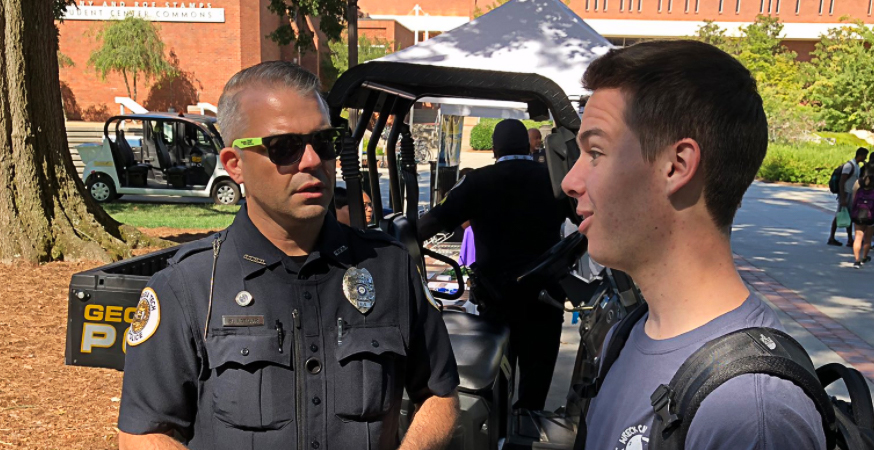Posted on 17 September 2018.

“On three. One … two …three … Don’t suck!”
The group of college guys huddle up before their performance to hype each other up, and that is their mantra.
Caleb Wikle, music director for Sympathetic Vibrations and fourth-year PHYS, described the cheer as one of the all-male a cappella group’s traditions.
“We set the bar low, because everyone at Georgia Tech is such a perfectionist. So even if we don’t do as well as we wanted to, well, we didn’t suck that much,” said Wikle.
The Sympathetic Vibrations group, sometimes colloquially referred to as SympVibes, exceeds their own expectations on a regular basis, performing modern arrangements of songs with just their voices at international competitions, concerts, weddings and events across campus.
Sympathetic Vibrations started 21 years ago in 1997 and is the oldest a cappella group on campus. Its name comes from a physics phenomenon: when two tuning forks are placed close to one another and one is struck, the other will sound as well, picking up on the vibrations. The ten to 15 guys who are part of the group each year aim to use the same phenomenon to blend their own voices.
Not the traditional choral group, the guys in Sympathetic Vibrations cover popular songs, singing both the lyrics and instrumental parts with their voices. Recent examples include the trumpet-y sound of Fall Out Boy’s “Irresistible” and “Marilyn Monroe” by Pharrell Williams with its violin-like background.
“It’s not like I’m standing in the front telling everyone what to do. It’s an interactive, dynamic performance as opposed to just reading off sheet music,” said Wikle.
Recently, the group changed leadership after the three-and-a-half year music director Richard Huckaby graduated last May.
“Losing our long-time music director helps you reset and reevaluate what you want to do with the group,” said Wikle.
After being a part of the group since his freshman year in 2015, he was chosen to lead the group. His role includes running rehearsals, communicating with group members and making sure their music is the best it can be.
“It’s a little bit more responsibility, and sometimes I think ‘am I really the most qualified?’ But we have so many talented guys in there. It’s just a blast,” Wikle said.
One way the group is evolving this year is through their song choices. The songs change almost every year, and by the end of the semester, the group has up to 15 songs learned and ready to perform. While in the past the group has tended towards popular or alt-rock music, they seek to be constantly evolving over time as different members and influences come and go.
“Right now we’re transitioning more to hip-hop and R&B, while still keeping some good songs everyone knows in our back pocket,” said Wikle. “We’re just expanding our horizons a little bit.”
Song selection is a democratic group effort for Sympathetic Vibrations. The members arrange their songs themselves, with over half of the members able to write the music. This lends the group’s performance diversity. Singing in front of audiences can be a stressful process, so the goal is to make everyone as comfortable as possible. After all, according to Wikle, “It’s not my group. It’s everyone’s group.”
This year the group may also be reevaluating the choice to compete. In the past, Sympathetic Vibrations has competed in the ICCAs, the International Championship of Collegiate A Cappella. This international competition hosts hundreds of college groups every year.
Going beyond what blockbusters like Pitch Perfect may show, judging considers not only choreography and song choices, but soloist vocal quality, professionalism, diction and blending of the members’ voices.
Sympathetic Vibrations placed first place in ICCA quarterfinals two years in a row in 2017 and 2018 after only one prior competition experience.
“It’s a lot of stiff competition … but I think we did so well those past couple years because we brought something to the table that not a lot of groups are willing to do, especially guys groups, which was giving it our all, bringing a lot of energy, having fun on the stage,” said Wikle. “That’s what people want to see. They want to see people having fun together, and then transmitting that emotion to the audience.”
One song they sang at the ICCAs was a 12-part harmony rendition of Justin Timberlake’s “My Love.” Every group member had a different part to sing, all while performing choreography on stage with a microphone in hand. This commitment to trying the difficult and unexpected is one of Sympathetic Vibrations hallmarks.
“We just like doing cool arrangements that other groups might not be willing to do, because they’re afraid of failing or not sounding professional,” Wikle said. “But we’re all just a bunch of engineers and computer scientists who are just like ‘Why not? Let’s try it out and see how it goes?’ Even if we’re struggling a lot, we’re always there to help each other out.”
There are many on-campus opportunities to witness these computer scientists and engineers singing, dancing and beatboxing.
Sympathetic Vibrations holds concerts the last week of every semester, right before exams. They also perform at various other events on and around campus, such as greek events, so keep an ear out for their melodies.




